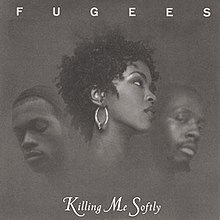Killing Me Softly with His Song
| "Killing Me Softly with His Song" | ||||||||
|---|---|---|---|---|---|---|---|---|

One of A-side labels of U.S. vinyl single
|
||||||||
| Single by Roberta Flack | ||||||||
| from the album Killing Me Softly | ||||||||
| B-side | "Just Like a Woman" | |||||||
| Released | January 21, 1973 | |||||||
| Format | 7" single | |||||||
| Recorded | November 17, 1972 | |||||||
| Genre | Soul | |||||||
| Length | 4:46 | |||||||
| Label | Atlantic | |||||||
| Writer(s) | ||||||||
| Producer(s) | Joel Dorn | |||||||
| Roberta Flack singles chronology | ||||||||
|
||||||||
|
||||||||
| "Killing Me Softly" | ||||
|---|---|---|---|---|
 |
||||
| Single by Fugees | ||||
| from the album The Score | ||||
| Released | May 31, 1996 | |||
| Format | CD single | |||
| Recorded | 1995 | |||
| Genre | Hip hop soul | |||
| Length |
|
|||
| Label | Ruffhouse | |||
| Producer(s) | ||||
| Fugees singles chronology | ||||
|
||||
"Killing Me Softly with His Song" is a song composed by Charles Fox with lyrics by Norman Gimbel. The song was written in collaboration with Lori Lieberman, who recorded the song in late 1971. In 1973 it became a number-one hit, in US and Canada, for Roberta Flack, also reaching number six in the UK Singles Chart. The song has since been covered by numerous artists, including a version by the Fugees that won the 1997 Grammy for Best R&B Performance by a Duo or Group with Vocal.
Norman Gimbel came to California in the mid-1960s. He was introduced to the Argentinean-born composer Lalo Schifrin (then of Mission: Impossible fame) and began writing songs to a number of Schifrin's films. Both Gimbel and Schifrin made a suggestion to write a Broadway musical together, and Schifrin gave Gimbel an Argentinean novel—Hopscotch by Julio Cortázar—to read as a possible idea. The book was never made into a musical, but in chapter two, the narrator describes himself as sitting in a bar listening to an American pianist friend "kill us softly with some blues". Gimbel put the phrase in his "idea book" for use at a future time with a parenthesis around the word "blues" and substituted the word "song" instead.
According to Lori Lieberman, who performed the original recording in 1971, the song was born of a poem she wrote after experiencing a strong reaction to the Don McLean song "American Pie". She then related this information to Gimbel, who took her feelings and put them into words. Then Gimbel passed the words to Fox, who set them to music.
...
Wikipedia

